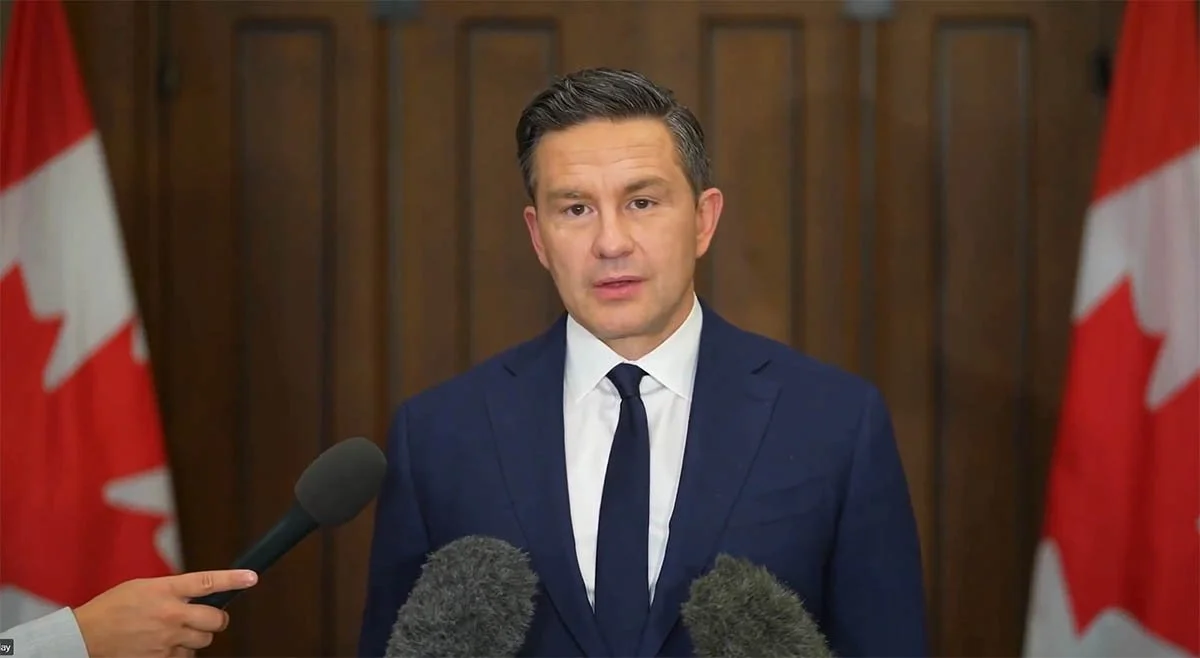Debate on temporary foreign workers program
Conservative Leader Pierre Poilievre says if elected, his government would ‘permanently scrap the Temporary Foreign Worker (TFW) program and immediately end new permits.’ / SCREENSHOT
The future of Canada’s temporary foreign worker program has become a political flashpoint, with rural employers and business leaders warning that ending it would hurt communities already struggling with chronic labour shortages.
Conservative Leader Pierre Poilievre announced earlier this month that a Conservative government would “permanently scrap the Temporary Foreign Worker (TFW) program and immediately end new permits.” He said the policy is necessary to protect young Canadians from being shut out of the job market.
“Not long ago, young Canadians could gain vital skills in entry-level jobs, earn enough to pay for school, and build a future,” Poilievre said. “In return, employers built a skilled domestic workforce. But the Liberals broke that deal, leading to staggering youth unemployment and heartbreaking stories of graduates sending hundreds of resumes without a single callback.”
The Conservatives argue that the program has flooded the market with cheap labour, pointing to a 1,131 per cent increase in TFW hires at Tim Hortons over the past four years. “It’s time to take decisive action to protect our youth and workers,” Poilievre said.
But employers in rural Canada counter that temporary workers are critical to keeping businesses afloat. Osborne Burke, general manager of Victoria Co-operative Fisheries in Neils Harbour, N.S., said Poilievre’s proposal shows “he doesn’t understand the struggle that rural communities face in filling positions.”
“I ask Mr. Poilievre, I challenge him: where are these workers that are unemployed that are looking for work?” Burke said. “Reality, contrary to what Mr. Poilievre says, is there’s nobody else left to employ.”
Burke said his co-op first tapped into the program in 2013, bringing in 10 workers. This year, the number rose to 35, mostly from Mexico. “We do not have the labour pool. We do not have the workforce,” he said.
The Canadian Chamber of Commerce is also urging caution. In a letter to federal ministers last week, the chamber called for a “meticulous review” of the entire program, pushing back against what it describes as “misconceptions” linking youth unemployment to temporary foreign workers.
“We sent this letter because we feel that the immigration system is facing a crisis. It doesn’t seem to be working well for anyone, not for newcomers, not for employers,” said Diana Palmerin-Velasco, senior director of the chamber’s future of work department. “There are no clear rules and predictability, and this letter comes out of a concern that we might be forgetting that immigration is actually an economic imperative.”
She added that youth typically aren’t applying for the kinds of rural, overnight jobs often filled by temporary workers. Key sectors with “persistent labour challenges” include agriculture, construction, food processing and food services.
The federal government says temporary foreign workers make up “approximately one per cent of the labour force in Canada,” and that the number of low-wage permits is down 70 per cent this year. An updated Immigration Levels Plan is expected before Nov. 1.
Former Alberta Premier Jason Kenney, who also served as an immigration minister under the Conservative government of Stephen Harper, said Poilievre’s call to end the program is wrong.
“To borrow a phrase from Bill Clinton, mend it, don't end it. I think the Conservatives are overreaching in their recent demands on this, but a lot more needs to be done,” he said during a Canada 2020 event on Sept. 23.
“I think we had a policy setting circa 2013 with reforms that I implemented at Immigration and then at Employment and Social Development that reduced the intake of low skilled temporary foreign workers by 80 per cent but it was still available on a limited basis in regions of very low unemployment. But you could only bring in a maximum of 10 per cent of your workforce who are TFW so my solution is mend it. Don't end it.”
For Burke, however, the need is immediate. “We’re in competition with [the] national park, local restaurants, local hotels and the seafood industry, the harvesters as well, looking for crew members,” he said. “Without these workers, we simply can’t operate.”

